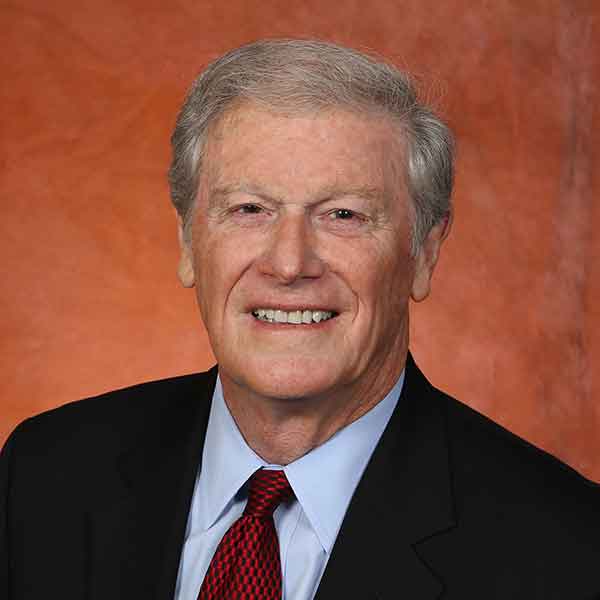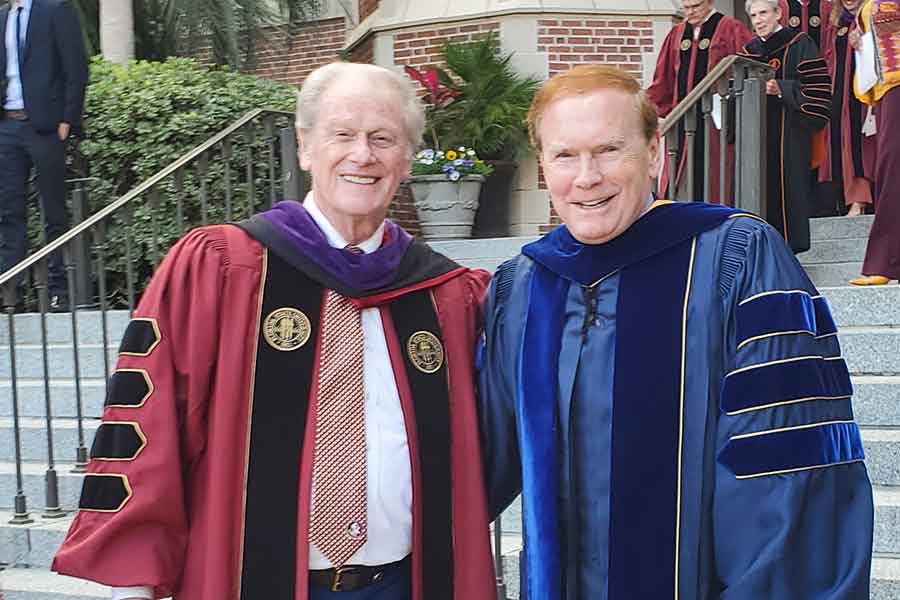
The motto for Florida State University’s College of Criminology and Criminal Justice is, “Bringing research to life.” It is embossed on the 158-lb bronze seal that hangs in the college’s lobby, a declaration of a commitment to research that translates into the real world.
Dean Thomas Blomberg said of the credo: “It is part of who we are.”
For the seven years he was president of FSU, it was part of who John Thrasher was too.
Thrasher, 81, died last May and, as family, friends and members of the FSU community gather for this week’s celebration of his life, those inside the CCCJ join them in remembering the indelible impact Thrasher made on FSU, and their college in particular.
OVERCOMING EARLY SKEPTICISM
Prior to taking the helm at FSU, Thrasher was an accomplished attorney with a political background comprised of more than 20 years combined in the Florida Senate and the Florida House of Representatives, where he ascended to the speakership.
He was a two-degree graduate of FSU and unabashed supporter of Seminole athletics but, despite those bona fides, expectations for the incoming president were mixed, Blomberg said.
“There was skepticism when he arrived at FSU, a lot of people had questions about how this politician would fit at a university,” he said. “Within a year those questions were gone; it’s one of the most remarkable things I’ve ever seen.”
Exquisite people skills and wisdom gleaned through decades in Florida politics were assets Thrasher wielded on behalf of FSU, helping pass legislation that established the FSU College of Medicine, expanding programs aimed at helping first-generation college students, leading a $1.16 billion fundraising campaign and propelling the University’s rankings to their highest levels.
Thrasher was a regular presence in the CCCJ, where he and Blomberg taught a class on translational politics and co-authored research papers. He drove the creation of the Capital Region Real Time Crime Center, which provides 24-hour, real-time data to local law enforcement. It is the only center to have a college as an embedded research partner and last year was recognized as the nation’s top center by the National Real Time Crime Center Association.
“We are soon beginning renovation of the Kellogg Building and adding 50,000 square-feet of space to the college; it was President Thrasher that did that,” Blomberg said, before circling back to the mission. “I think that what he saw here was the pivotal role research plays in effective policy. He advocated for translational research. He appreciated our vision and our college blossomed because of it.”

FSU President John Thrasher and CCCJ Dean Thomas Blomberg.
BUILDING A CULTURE
While Thrasher’s impact on the CCCJ yielded bricks-and-mortar results, they are a distant second to the personal impressions he made.
His ability to remember not just the names of staff, faculty and students but details of their lives, conveyed a level of care that helped forge a culture.
“He was adored by the students,” said George Pesta, associate professor and director of the Center for Criminology and Public Policy Research. “He liked being around people, he liked the students and he liked mentoring. He immediately made you feel like you mattered. He didn’t just listen; he heard you.”
Pesta recalled that, on his routine walks across campus, Thrasher would say hello to students by name, asking questions specific to their major. One of those students was Pesta’s daughter, who was enrolled in FSU’s music program at the time.
“The president remembered who she was and that blew her away,” he said. “To have him as a champion for FSU, our college and our mission, with the way he cared —and his leadership skills— was a gift.”
Thrasher’s knack for personal connection sparked results because it was genuine, said Kristin Lloyd, who was a doctoral student during his tenure and is now an assistant professor at Clemson University.
“There were many times we would just run into each other and he would initiate conversations,” she said. “We had a really long chat about what makes FSU great and how decisions are made and how tough it could be as president to make the right choice. To have the leader of this university give that inside perspective to a student showed how much he cared.”
Lloyd added: “He loved Florida State as much as anyone has ever loved Florida State and I think a big part of FSU becoming a top-ranked, public university under his leadership is because of the relationships he built and the trust people put in him.”
That trust permeated CCCJ classrooms, where students could see Thrasher bridging the gap between theory and real-world policy, delivering on the college’s translational research mission in real time, said Kaylee Noorman, who took a class and worked on a research paper with Thrasher. Noorman is now working as a post-doctoral researcher in the college.
“I saw that he really valued the role of research in making policy decisions, that he was a champion for it and really elevated its importance,” she said. “Someone who recognizes the role of research in policy but also has the kind of experience and connections on the policy side: he embodied that idea of translational research.”
A PROJECT, A DISSERTATION AND AN INSTITUTE
Among the more enduring impacts Thrasher had on the college can be found in the Aging Adult Fraud Research & Policy Institute, where Assistant Professor Julie Brancale serves as co-director.
A representative from a financial services firm approached Thrasher expressing interest in learning more about the emerging problem of financial exploitation of older adults. Thrasher and VP for Faculty Development and Advancement Janet Kistner, brought the idea to Blomberg. Brancale, who was a graduate student at the time, was brought in shortly thereafter.
“That project lasted more than three years and President Thrasher worked very closely with us on it. He was always so interested in our findings and the best way to translate them and use this information to help protect this population of vulnerable adults,” she said. “That project became my dissertation and, really, the focus of my career.”
Brancale added: “Seeing him get excited about this research made me get so excited about it and I think that others had that experience too. Knowing his background —and knowing who he was conversing with about the work happening here— was exciting too.”
Thrasher’s interest in the projects he took on didn’t wane, neither did his disarming manner.
“Throughout me writing my dissertation, he would regularly check in to see how I was doing; he remained so interested in the research and in how I was doing,” Brancale said. “He had this way of being so in tune to what people around him were doing. He never forgot anybody’s name, always remembered an important or interesting thing we’d told him about ourselves and really made people feel special in every interaction he had with them.”
Blomberg said when he thinks of Thrasher, his thoughts inevitably wander to his keen sense of humor and ability to bring people of all stripes together.
“First and foremost, he was a friend and it was truly extraordinary to watch the effect he had on people, myself included,” Blomberg said.
Thrasher’s bronze statue is perched just yards from the lobby where the shield bearing the CCCJ motto is mounted. Blomberg said the president who overcame the skeptics helped that motto mean more.
“In our college, ultimately what we do, is aim to reduce the pain and suffering caused by crime,” Blomberg said. “If you’re not doing that, you’re missing the mark. John valued that and we are forever grateful to him for it.”
A celebration of President Thrasher’s life will be held on the FSU campus inside the Ruby Diamond Concert Hall on Tuesday, Aug. 19. Doors will open at noon and all members of the campus community and the public are invited.
For more information, visit John Thrasher Tribute.
